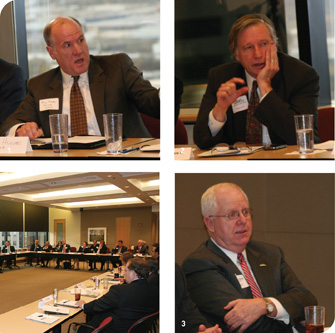
1. Rick Hughes articulated the reasons for building a 1,000-room convention hotel, saying it would bring a new kind of demand to Kansas City. | 2. R. Crosby Kemper III offered a sobering assessment of the city’s finances, and suggested that hard choices would have to be made about Downtown projects, a convention hotel in particular. | 3. Tom Metzger noted that Kansas City has key attributes that can’t be found in many other cities..
Other challenges will be overcoming the loss of a $15 million connection with the Big XII’s basketball tournament, given the University of Missouri’s decision to break ranks with the conference; changing the perception that Downtown has significant safety issues; and questions about whether the city—still—has in place the kind of sustained, focused leadership needed to navigate some of the challenges, a point diplomatically stated by host Stinson’s Mark Foster.
Still, as co-chairman Bill Dietrich of the Downtown Council noted, the city has been garnering positive media exposure at an unprecedented level, with outlets like The New York Times, Time magazine, PBS and Frommer’s Travel Guides all keying their coverage on the opening of the Kauffman Center for the Performing Arts. Much of that coverage recognized not just the recent artistic achievements of the city, but took the opportunity to explore Kansas City’s other attributes, as well. “We have to build on the positive press,” Dietrich said.
Tom Metzger, among the newer faces at this year’s assembly, noted that the city had much going for it when compared to other large metropolitan areas—in particular, his previous stop in Boston.
Despite its place in American history and commerce, Boston is a tough place to navigate, something Metzger was glad to leave behind 10 months ago when NBH Holdings purchased the lion’s share of Bank Midwest. The Country Club Plaza, he notes, stands out for its ease of access and ample, free and nearby parking. “You never see that in any other place,” Metzger said.
Still, he cautioned, the Kansas City community cannot depend on its time-honored crown jewels like the Plaza, or stand by to admire recent successes like those seen Downtown: “If you let your momentum carry you, things can get away from you.”
The Hotel Business
With that, co-chairman David Frantze of host Stinson Morrison Hecker began to peel back the developmental
onion. The first layer: Widespread calls for a 1,000-room convention hotel to augment the achievements of the Power & Light District and a $186 million renewal of the Kansas City Convention Center.
Rick Hughes laid out the case for the hotel. First, he noted that concerns about low occupancy levels in the hotel marketplace here miss a broader point. “We’re at record demand level,” he said, but when that demand is taking place within a greater supply of rooms, the occupancy rates alone don’t tell the entire story. A new hotel, he said, would bring additional demand to the table, room demand that simply doesn’t exist at this point. “We shouldn’t do this because it looks cool, we shouldn’t do this because we just want to add 1,000 rooms to the city, we should do this because it’s the best chance we have to bring net new economic impact” to Kansas City and Downtown, he said.